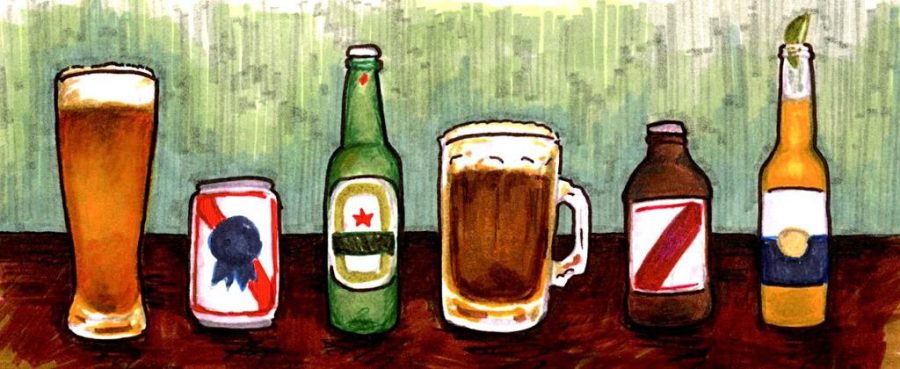I hate Natty Light, but I’m not better than it.
Beer doesn’t get tastier with age — it just goes bad. And a high price tag on a beer doesn’t immediately impress most people — something pretty remarkable in our culture. Drinking beer isn’t about affirming social status. It’s about drinking beer.
But the judgments associated with certain brands or varieties have intensified in recent years, as craft breweries begin to challenge mass-market corporations. Beer snobbery goes against everything the beverage represents, and many people who perceive craft brewing as inherently superior are operating on faulty logic.
The craft beer designation is essentially a business term. According to the Brewers Association, craft brewers only produce up to 6 million barrels of beer annually, and less than 25 percent of the company is controlled by a corporation responsible for 3 percent of annual beer sales nationally. These brewers generally rely on non-mechanized, traditional brewery techniques, and their relatively small size often restricts distribution to local regions.
There is also a litany of informal characteristics that consumers associate with this kind of beer. The beer itself usually has a higher alchohol by volume than mass-market ones, and most brewers have a larger flavor selection than the average line of light pilsners.
Most of these are decent criteria for preferring certain beers to others. Mass-market beers often taste pretty similar to me, and that can get boring. I also understand the value of a handcrafted product — there’s a nice illusion that these brewers aren’t really after our cash. And if you simply prefer to drink beer that gets you drunk faster, more power to you.
But other ideological reasons are less defensible.
According to a Nielsen survey of craft beer drinkers last July, 47 percent of craft beer drinkers think the products they buy are “fresher” than those from Big Beer. This idea largely comes down to many craft breweries’ use of bottles instead of cans.
In terms of actually connecting beer quality with container, though, this reasoning makes no sense. Cans do a better job than bottles at protecting beer from UV light, which is known to ruin beer’s flavor. Some people claim that beer from a can carries a bad flavor or taste, but those people are actually just smelling and tasting the can itself as they drink. If drinkers simply pour their beer into a glass, the problem magically disappears, so the quality ceiling for canned beer is actually higher than bottled.
The irony about canned beer is that more craft brewers would rely on it if they could. The MicroBrewr podcast interviewed 30 craft brewery owners and critics, and only 27 percent preferred bottles to cans. Overhead costs were the primary reason brewers didn’t use cans — canning operations are far more expensive than bottling.
Quality judgments associated with brewery locality — the highest factor for customers, according to the Nielsen study — are similarly flawed. Exclusively purchasing beer made locally to support regional industry is commendable, but that has no bearing on the taste of the actual product.
Expansion is the result of success. When a brewery has a product that a lot of people like, selling it to even more of them and moving into areas where people didn’t previously have access shouldn’t be a knock on the beer. More importantly, the popularity of any manufacturer should never count against the people purchasing it.
People have enjoyed imported beer for years, and judging from the 29,430,185 barrels worth of imported craft beer sales in 2014, they still are. Many of those products don’t even come from this hemisphere, and craft beers from Belgium and Germany are some of the most popular in the industry. Applying a lower threshold of acceptability once you are looking across state borders is nonsense.
There’s a lack of consistency in even the most superficial pieces of information: whether breweries actually earn their “craft” label.
Many of the most popular craft brands are actually owned by Big Beer. Goose Island Beer Company and Shock Top Brewing Company both belong to Anheuser-Busch InBev. MillerCoors owns Leinenkugel’s Brewery, Saint Archer Brewing Company and Blue Moon Brewing Company. If craft brew aficionados are really so dedicated to their beverage ideology, it doesn’t make much sense that these rank among the highest selling “craft beers” nationally.
That leaves us with flavor as a determining factor.
Some people just like drinking craft beer more than Coors or Budweiser. The flavors associated with craft beer are usually much more complex and distinctly hoppy.
But there’s no such thing as an objective flavor criteria. Someone could just as easily prefer the ease of chugging a Milwaukee’s Best or sipping on a Corona during a beach trip, and there’s nothing wrong with that.
Beer snobbery is simply an example of pretentious people being pretentious. Craft beer is by not inherently better than anything else, and looking down on people who choose to stick with their light beers is silly.
Cheap beer has its benefits. Namely, it’s cheap. You can find it just about anywhere.
And in an ideal world, it’s judgement-free.
Matt Moret is the Opinions Editor for The Pitt News. He primarily writes about politics and rhetoric.
Write to Matt at [email protected]



